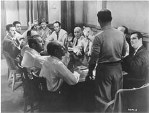What Do Reasonable Jurors Get to Decide After Scott v. Harris?
 This is my second post commenting on Dan Kahan’s talk last week about his paper, co-authored with David Hoffman and Donald Braman, entitled “Whose Eyes are You Going to Believe? Scott v. Harris and the Perils of Cognitive Illiberalism.” (It was originally one post but got long.) Scott v. Harris is the case involving the video of the police chase, a video the Supreme Court found so compelling that it ruled the denial of summary judgement to the defendant police officer was error. Kahan and his co-authors argue that Scott harmed the legitimacy of the justice system when it concluded that all reasonable people would view the video tape the same way. In fact, Kahan et al. demonstrate that a significant number of potential jurors disagree with the majority’s view.
This is my second post commenting on Dan Kahan’s talk last week about his paper, co-authored with David Hoffman and Donald Braman, entitled “Whose Eyes are You Going to Believe? Scott v. Harris and the Perils of Cognitive Illiberalism.” (It was originally one post but got long.) Scott v. Harris is the case involving the video of the police chase, a video the Supreme Court found so compelling that it ruled the denial of summary judgement to the defendant police officer was error. Kahan and his co-authors argue that Scott harmed the legitimacy of the justice system when it concluded that all reasonable people would view the video tape the same way. In fact, Kahan et al. demonstrate that a significant number of potential jurors disagree with the majority’s view.
On Friday, I tangled with the article’s proposed solution to the problem of denying those jurors their day in court. Today, I want to examine the decision itself–did the majority really rule that no reasonable juror could conclude that the force used in the case was excessive? That’s actually not the way it looks to me. Rather, it looks to me like, after a preliminary finding about dangerousness, the Scott majority pretty much threw the whole fact vs. law distinction out the window. Scott doesn’t just insult “unreasonable” jurors; even reasonable jurors get short shrift.

